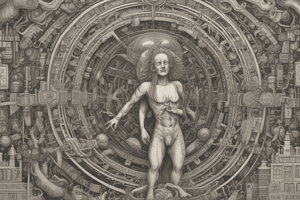Podcast
Questions and Answers
What is conflict theory?
What is conflict theory?
- The view that human behavior is shaped by interpersonal conflict. (correct)
- The view that economic class position causes crime.
- The view that criminality comes from abnormal traits.
- The view that crime is a function of decision-making.
What does rational choice theory emphasize?
What does rational choice theory emphasize?
- Crime is a function of a decision-making process. (correct)
- Crime results from environmental factors.
- Victimization is affected by where individuals live.
- Human behavior is learned through reinforcement.
What does trait theory propose?
What does trait theory propose?
Criminality is a product of abnormal biological or psychological traits.
What is the primary cause of crime according to social structure theory?
What is the primary cause of crime according to social structure theory?
What does social process theory investigate?
What does social process theory investigate?
According to racial threat theory, what happens as the black population increases?
According to racial threat theory, what happens as the black population increases?
What is victim precipitation theory?
What is victim precipitation theory?
What does deviant place theory emphasize?
What does deviant place theory emphasize?
What is routine activities theory?
What is routine activities theory?
Describe arousal theory.
Describe arousal theory.
What is the basis of psychodynamic theory?
What is the basis of psychodynamic theory?
What does attachment theory focus on?
What does attachment theory focus on?
What is behavior theory about?
What is behavior theory about?
Explain social learning theory.
Explain social learning theory.
What does cognitive theory focus on?
What does cognitive theory focus on?
What is information-processing theory concerned with?
What is information-processing theory concerned with?
Describe nature theory.
Describe nature theory.
What does nurture theory argue?
What does nurture theory argue?
What does social disorganization theory focus on?
What does social disorganization theory focus on?
Explain strain theory.
Explain strain theory.
What does cultural deviance theory combine?
What does cultural deviance theory combine?
What is anomie theory?
What is anomie theory?
Describe general strain theory.
Describe general strain theory.
Explain institutional anomie theory.
Explain institutional anomie theory.
Flashcards are hidden until you start studying
Study Notes
Conflict Theory
- Human behavior is influenced by interpersonal conflict.
- Those in power exploit it for self-serving purposes.
Rational Choice Theory
- Criminal activity is a result of a decision-making process.
- Offenders evaluate costs versus benefits before committing a crime.
Trait Theory
- Criminality stems from abnormal biological or psychological characteristics.
Social Structure Theory
- Economic disadvantage is a key driver of criminal behavior.
Social Process Theory
- Criminality emerges from social interactions within institutions and processes.
Racial Threat Theory
- An increase in the black population amplifies perceived threats to the white population.
- This leads to heightened social control over black communities.
Victim Precipitation Theory
- Victims may play a role in provoking situations leading to their own victimization.
Deviant Place Theory
- Victimization risk is largely determined by geographic location.
Routine Activities Theory
- Victimization arises from three factors: suitable targets, lack of guardians, and motivated offenders.
Arousal Theory
- Individuals seek to maintain preferred arousal levels, potentially leading to aggressive behavior due to high-stimulation needs.
Psychodynamic Theory
- Developed by Freud, it posits that personality is shaped by unconscious processes from early childhood involving the id, ego, and superego.
Attachment Theory
- Bowlby’s theory emphasizes the importance of emotional bonds for lifelong mental health.
Behavior Theory
- Human behavior is learned through the reinforcement system (rewards and punishments).
Social Learning Theory
- Behavior is influenced by observing others.
- Actions that are rewarded are more likely to be repeated.
Cognitive Theory
- Focuses on how people perceive their surroundings and solve problems mentally.
Information-Processing Theory
- Examines how individuals process and manipulate information for decision-making.
Nature Theory
- Intelligence is largely genetically determined, linking low intelligence to criminal behavior.
Nurture Theory
- Argues that intelligence is shaped by environmental factors, not heredity.
- Low IQ is a symptom of environmental conditions rather than a direct cause of crime.
Social Disorganization Theory
- Examines how the deterioration of inner-city neighborhoods affects institutions like family and school, leading to increased crime.
Strain Theory
- Describes the negative emotions experienced by those who feel unable to achieve goals through legitimate methods.
Cultural Deviance Theory
- Connects social disorganization and strain to the creation of subcultures that conflict with societal norms.
Anomie Theory
- Anomie occurs when societal goals are unequal in terms of access to legitimate means, creating a disconnect and potential for crime.
General Strain Theory
- Suggests that various strains combine with individual emotional responses to lead to criminal behavior.
Institutional Anomie Theory
- Explores how societal institutions, particularly focus on financial success, contribute to an environment conducive to crime.
Studying That Suits You
Use AI to generate personalized quizzes and flashcards to suit your learning preferences.




